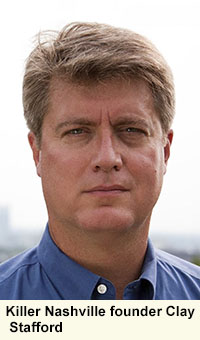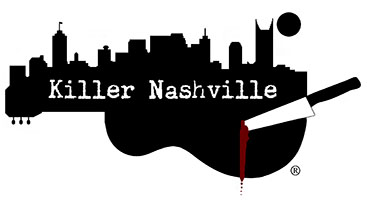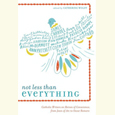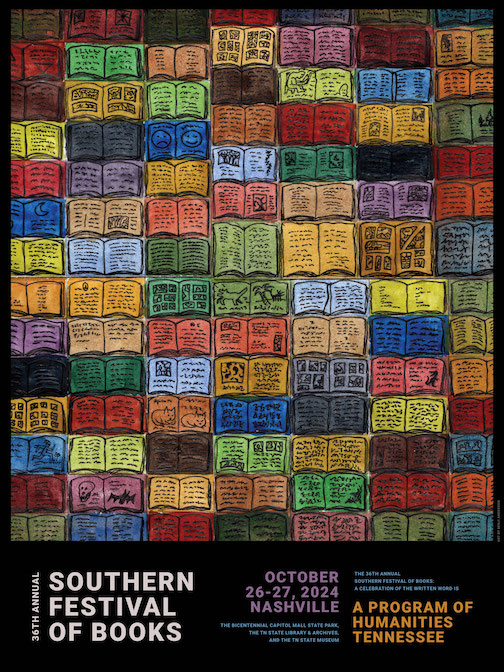A Killer Conference
The Killer Nashville conference brings a human touch back to the hardboiled business of crime writing
A little over a year ago, Dana Chamblee Carpenter, Nashville-based author of the forthcoming historical thriller Bohemian Gospel, found herself in an all-too-common situation for a first-time novelist. “I had an agent, and my book was on submission with publishers, but I was getting very discouraged,” Carpenter says. “My husband encouraged me to submit it for Killer Nashville’s Claymore Award competition, and they called a few months later to tell me I was a finalist. I was very glad, but I went to the awards dinner expecting nothing and couldn’t believe it when I won. Within two weeks, I had editors at publishers who had passed on it suddenly become very interested.”
 The Claymore Award for an unpublished crime novel is only one feature of Killer Nashville, a four-day writers’ conference that will be celebrating its tenth anniversary this year. The event focuses on connecting mystery, suspense, and crime writers with agents, publishers, and reference resources, as well as providing a social event for writers to meet and mingle with their peers. Founded in 2006 by writer and filmmaker Clay Stafford, Killer Nashville has grown into an international conference that attracts 500 attendees from the U.S., Italy, South Korea, Japan, Australia, the United Kingdom, and more. This year’s event will feature panel discussions, writer workshops, editor-agent roundtables, and forensic presentations by law-enforcement officials.
The Claymore Award for an unpublished crime novel is only one feature of Killer Nashville, a four-day writers’ conference that will be celebrating its tenth anniversary this year. The event focuses on connecting mystery, suspense, and crime writers with agents, publishers, and reference resources, as well as providing a social event for writers to meet and mingle with their peers. Founded in 2006 by writer and filmmaker Clay Stafford, Killer Nashville has grown into an international conference that attracts 500 attendees from the U.S., Italy, South Korea, Japan, Australia, the United Kingdom, and more. This year’s event will feature panel discussions, writer workshops, editor-agent roundtables, and forensic presentations by law-enforcement officials.
“No matter where a writer is in their career, there is something for them,” Stafford says. “We have six tracks of programming running concurrently throughout the day, directed to authors at different stages of their careers. We have assistance for beginning writers on how to plot and sharpen their prose. For someone who has completed a manuscript, we supply advice on how to get representation and connect to the publishing industry. Then we have published authors who want to take their careers to the next level.”
The extra boost that Killer Nashville can supply is something that NYC-based author Jonathan Stone has experienced firsthand. In 2012, Stone had four published novels to his credit but found his career stalled. That’s when he decided to submit an unpublished manuscript for the Claymore competition.
 “I submitted the manuscript for Moving Day and forgot about.” Stone says. “A few months later I got a phone call that I was in the top ten, and I decided to attend the conference. I couldn’t believe when I won. I got a new agent, who I met at Killer Nashville. There was a scramble for the film rights, which sold quickly, and as a result, Thomas & Mercer, the crime-fiction imprint of Amazon Publishing, bought the novel for publication.”
“I submitted the manuscript for Moving Day and forgot about.” Stone says. “A few months later I got a phone call that I was in the top ten, and I decided to attend the conference. I couldn’t believe when I won. I got a new agent, who I met at Killer Nashville. There was a scramble for the film rights, which sold quickly, and as a result, Thomas & Mercer, the crime-fiction imprint of Amazon Publishing, bought the novel for publication.”
Published in May 2014, Moving Day became Amazon’s “Kindle First” pick for the month and has re-energized the sale of Stone’s past novels and also led to contracts for future books. “This was a thing that was in a drawer for fifteen years,” Stone says, “and the traditional publishers had soundly turned it down. Killer Nashville changed everything for me.”
It’s not just award winners who have found the right business connections at Killer Nashville, according to Clay Stafford. “We have hundreds of success stories, and they come in different ways,” he says. “Some are from our pitching sessions, some from our agent-editor roundtables, and some from networking. One of my favorites is from Margaret Fenton. She was pitching her novel Little Lamb Lost. She went to all the pitch sessions, and nothing worked out, so she went to the bar. She was sitting alone at the bar, and another author came in and started talking to her. She started telling him about her novel, and he went and got his editor, brought her back to the bar, and Margaret walked away with a publishing contract.”
Those personal connections that are often born and nurtured at Killer Nashville and other conferences can make a huge difference in a writer’s career. “With the way the industry is now, all editors are short on time, and no one can function the way they used to back in the golden days of publishing,” Stafford says. “What we do at Killer Nashville is try to take it back to that time when it was a gentleman’s—or lady’s—business, when an author’s voice could be nurtured with solid advice from experienced professionals and then connected to the right agent or editor. We purposely design the conference so everyone has to mingle. Everyone who attends has a desire to nurture new writers and give back to others because that’s what Killer Nashville is really about.”
It’s a sentiment that Dana Chamblee Carpenter echoes, “I’ve got to meet so many warm and wonderful people, and we have continued to encourage each other as writers. Whether you’re a beginning writer or are already established, Killer Nashville is a wonderful place to learn about craft but also to build relationships. That’s not always true at some writers’ conferences. A lot of them are very competitive and cutthroat, but this one is special.”

Randy Fox is a freelance writer whose writing on music and pop culture has appeared in Vintage Rock, Record Collector, East Nashvillian, Nashville Scene, Jack Kirby Collector, Hardboiled, and many other publications. He lives in Nashville.


